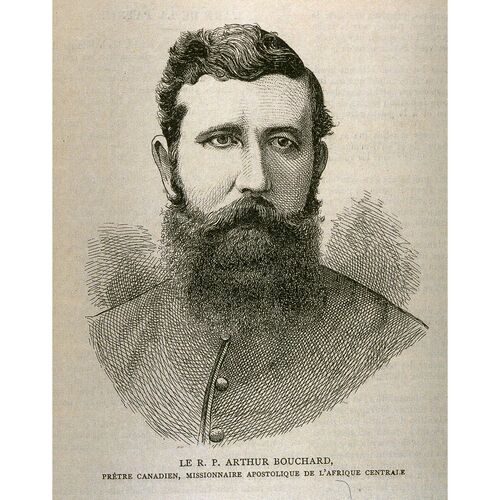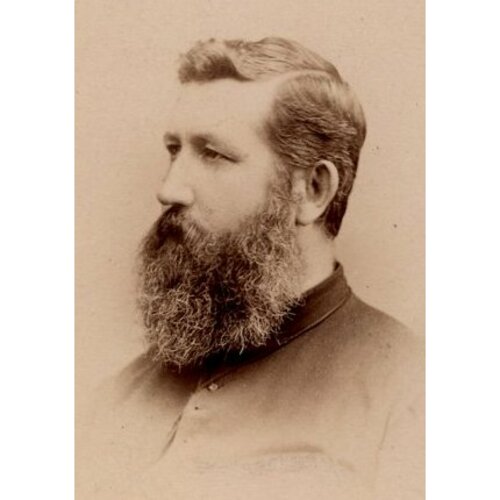BOUCHARD, ARTHUR (baptized Thomas-Arthur), artisan, Roman Catholic priest, and missionary; b. 4 Jan. 1845 in Rivière-Ouelle, Lower Canada, son of Mathieu Bouchard, a blacksmith, and Félicité Lebel; d. 12 Sept. 1896 in Port of Spain (Republic of Trinidad and Tobago).
Arthur Bouchard came from a poverty-stricken family and lost his mother when he was just a child. He went to school in Saint-Denis and at the age of 15 was apprenticed as a tailor, a trade he subsequently practised at L’Isle-Verte and Trois-Pistoles. He then spent a year as a novice with the Oblates of Mary Immaculate in Ottawa, with the intention of becoming a lay brother and afterwards a missionary. But he fell dangerously ill and had to leave the community. He took refuge in the Séminaire de Saint-Sulpice in Montreal, working as a door-keeper and tailor. Later he was employed in that city by a manufacturer and vendor of church ornaments.
In 1872 Bouchard met Herbert Alfred Vaughan, an English priest who had come to Canada to recruit potential missionaries. Feeling himself called, he went first to the seminary established by Vaughan in Baltimore, Md. Following his stay there, he spent four years at St Joseph’s College in London, England, and finished his theological studies in Verona, Italy, where he was ordained to the priesthood on 11 Aug. 1879.
Bouchard began to serve as a missionary in Cairo. In November 1879 he left for the Sudan and settled at Khartoum, where the principal residence of the Catholic mission to the Sudan was located. He worked diligently there, under considerable hardship, for he constantly had to contend with a difficult climate, illness, poverty, indifferent food, and a scarcity of resources. In addition, the problems of slavery and the traffic in black children worried him greatly.
In November 1881 Bouchard was sent to Italy to report on the needs of the mission and he arrived at Rome on 7 Jan. 1882. He spent the month of March in Paris, collecting funds for the mission. On 25 June he reached Quebec. With the approval of the archbishop of Quebec, Elzéar-Alexandre Taschereau, he spent two years travelling through the parishes of the diocese, preaching, lecturing about the African missions, and raising money for them.
In September 1884 Bouchard was called back to the Sudan, this time as chaplain to a contingent of Canadian voyageurs under Lieutenant-Colonel Frederick Charles Denison, which formed part of a British expedition led by Garnet Joseph, Lord Wolseley*. Since 1881 the Sudan had been in the grip of disturbances fomented by the Mahdi. In January 1885 the Mahdi’s forces captured Khartoum and the commander of the garrison, Major-General Charles George Gordon, was killed. The British expedition arrived too late to rescue him.
Bouchard came back to the diocese of Quebec in May 1885. He was named priest in charge of the parish of Notre-Dame-de-Lourdes, but shortly after his arrival the church, the presbytery, and part of the village burned down. As a result, he was appointed curate of Sainte-Julie (in Laurierville), responsible also for serving Notre-Dame-de-Lourdes. In November of that year he became curé of Saint-Étienne at Beaumont, where he had a sacristy built. Increasingly incapacitated by illness, he resigned his charge in August 1888 and left for Trinidad (Republic of Trinidad and Tobago), seeking to recover his health. He was made priest of a parish on the island. By July of the following year he had recuperated and was back in Quebec. Until October 1891 he served as curé of Saint-Pierre-Baptiste. In November he entered the noviciate of the Blessed Sacrament Fathers in Brussels, but he had to leave in January 1893 because of ill health. He returned to Quebec and became curé of Notre-Dame-de-la-Garde on 13 April. During the winter of 1894–95 he fell seriously ill and his physician advised him to leave the country for a warmer clime. He went back to Trinidad and settled in Port of Spain, where he died on 12 Sept. 1896.
According to his friend and confidant the abbé Henri Têtu, Arthur Bouchard was a simple man, cheerful, likeable, and good-hearted. Piety, zeal for saving souls, and a spirit of sacrifice were his outstanding qualities. Demonstrably an excellent speaker and a “joyful and indefatigable talker,” he always won the respect and confidence of his parishioners.
ANQ-Q, CE3-15, 5 janv. 1845. L’Opinion publique, 24 août 1882. Allaire, Dictionnaire. R. A. Preston, Canada and “Imperial defense”; a study of the origins of the British Commonwealth’s defense organization, 1867–1919 (Toronto, 1967). Honorius Provost, Notre-Dame-de-la-Garde de Québec, 1877–1977 (Québec, 1977). P.-G. Roy, À travers l’histoire de Beaumont (Lévis, Qué., 1943), 176–77. Henri Têtu, Le R.P. Bouchard, missionnaire apostolique (Québec, 1897).
Cite This Article
Honorius Provost, “BOUCHARD, ARTHUR (baptized Thomas-Arthur),” in Dictionary of Canadian Biography, vol. 12, University of Toronto/Université Laval, 2003–, accessed December 31, 2025, https://www.biographi.ca/en/bio/bouchard_arthur_12E.html.
The citation above shows the format for footnotes and endnotes according to the Chicago manual of style (16th edition). Information to be used in other citation formats:
| Permalink: | https://www.biographi.ca/en/bio/bouchard_arthur_12E.html |
| Author of Article: | Honorius Provost |
| Title of Article: | BOUCHARD, ARTHUR (baptized Thomas-Arthur) |
| Publication Name: | Dictionary of Canadian Biography, vol. 12 |
| Publisher: | University of Toronto/Université Laval |
| Year of publication: | 1990 |
| Year of revision: | 1990 |
| Access Date: | December 31, 2025 |


![Le R. P. Arthur Bouchard prêtre canadien, missionnaire apostolique de l'Afrique Centrale [image fixe] : Original title: Le R. P. Arthur Bouchard prêtre canadien, missionnaire apostolique de l'Afrique Centrale [image fixe] :](/bioimages/w600.5199.jpg)


